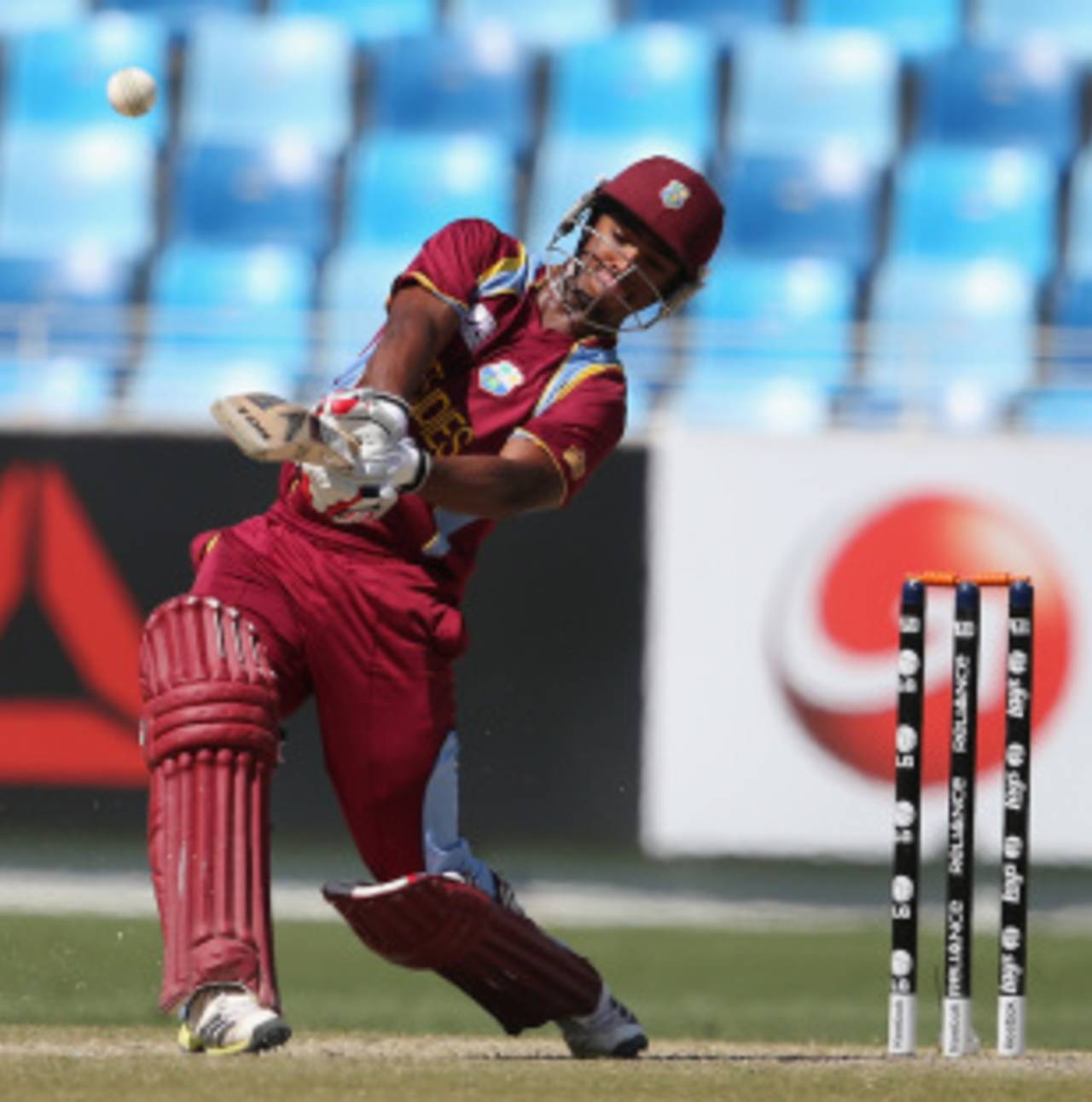West Indies' rocky road ahead
The board president has a grand vision for the Test team but a short-first class season, poor pitches, and the lure of T20 could thwart those ambitions
Tony Cozier
23-Mar-2014

Nicolas Pooran: a big star even before his first-class debut, and seemingly fated to be lost to T20 • ICC
Less than a year in as president, Dave Cameron has set himself and the West Indies Cricket Board what appears to be nothing less than a mission impossible. He asserted in a newspaper interview last week that his board considers West Indies' value to be based on the team's Test status so that "the plan is clearly to get us back to the top, not just the top three, but number one".
It was a U-turn since the board's cancellation last year of two Tests each against Sri Lanka and Pakistan in favour of a couple of one-day series, the first also involving India. Now Cameron said that "if the West Indies can be a force again in the Test arena, I would feel that strides have been made under my tenure". It was an understatement.
To produce such a transformation calls for a rapid rise in standards on the field, and at the same time reigniting the flame among a passionate public, so depressed after years of an unrequited love affair with Test cricket that it has found a new infatuation in the glamorous attraction of the T20 version.
West Indies presently languish at No. 8 on the ICC's Test rankings, below all the major teams. Since being toppled by Australia in 1995 from the top spot they held for 15 years, when they did not lose a series, they have rarely risen above halfway on the table. They haven't won a Test against India in their last five series, only one each against Australia and England in their last six.
So how can Cameron's goal be achieved?
The board's directors are to discuss setting up "professional structures" at a meeting in Port-of-Spain this weekend; Cameron regards this as a priority. So does new director of cricket, the widely travelled Englishman Richard Pybus.
Pybus, formerly in coaching positions in Pakistan (twice), Bangladesh (briefly) and South Africa, arrived last November to find obvious talent but a system that is well behind those of West Indies' competitors. At its forthcoming meeting, the board is to thrash out how best to implement his proposal to "professionalise the game properly".
The brevity of the first-class season is a long-term problem, especially since opportunities with English counties dried up, and more recently, as the top men were lost to overseas T20 franchises. One round leading to the semi-finals and final limits teams to a maximum of eight matches each; it is hardly ideal for developing Test cricketers.
It is a handicap compounded by slow, turning, unsatisfactory pitches, sometimes doctored to provide home advantage. They flatter bowlers and drain batsmen's confidence. In the 2013 tournament, eight totals were below 100, 34 between 100 and 200, just two over 400. Four of the five highest wicket-takers were spinners. Nikita Miller's 52 wickets were taken at eight runs each.
As important as boosting the team's strength is the task of reviving fans' interest in the regional game and Tests
Even with a longer season, properly marketed and promoted in a fully professional set-up, combined with more attention to pitches, there remains the predicament of how to retain players lured by the lucrative contracts of domestic T20 tournaments across the globe.
More and more are concentrating primarily on six-hitting and tight bowling; more will follow the lead of Samuel Badree and Krishmar Santokie, specialists not required for longer formats, even for their regional teams.
The latest prodigy is Nicolas Pooran, 18, a slim left-hander from Trinidad. He belted 54 off 24 balls in his first match in the Caribbean Premier League last year; his 143 off 160 balls, with six sixes and 14 fours against Australia was the innings of the Under-19 World Cup in Dubai. He is yet to play a first-class match. It won't be long before he is snapped up by an IPL outfit.
Chris Gayle, a batsman with a Test average of 42 from 99 Tests and a couple of triple-hundreds, is now universally acclaimed more for his T20 exploits. Sunil Narine, ranked by the ICC as the No. 1 bowler in T20 and No. 3 in ODIs, comes in at No. 68 in Tests. Shivnarine Chanderpaul, third among Test batsmen, doesn't get a game in the abbreviated stuff.
As important as boosting the team's strength is the task of reviving fans' interest in the regional game and Tests. Barbados and Trinidad & Tobago are the oldest and fiercest of sporting rivals. Think Lancashire and Yorkshire in England, New South Wales and Victoria in Australia. A couple of hundred diehards turned up for their current first-class clash at Kensington Oval where there used to be thousands. They were confined to one stand, the others closed to save on security costs. The same holds true everywhere - and has done for several seasons. When the T20 CPL comes around in July and August, every gate will be open, every seat taken, as they were last year.
The situation is not surprising. When West Indies triumphed in the World T20 championship in Sri Lanka in 2012, the Trinidad Express declared that it had "lifted the spirit of the entire region as one". It was a sentiment not heard since the days of Test dominance under Clive Lloyd.
It would apply again if there is a turnaround over the next two years - and fulfil Cameron's impossible dream.
Tony Cozier has written about and commentated on cricket in the Caribbean for 50 years